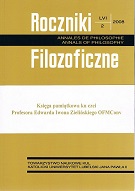Szkotyzm na tle paryskich kierunków filozoficznych i teologicznych przełomu XIII i XIV wieku
Scotism against the Background of Principal Philosophical and Theological Currents Present at Paris University at the Break of the 13th and 14th Cent.
Author(s): Mieczysław MarkowskiSubject(s): Philosophy
Published by: Towarzystwo Naukowe KUL & Katolicki Uniwersytet Lubelski Jana Pawła II
Keywords: Aristotelianism; Augustinianism; Scotism; philosophy; theology; arystotelizm; augustynizm; szkotyzm; filozofia; teologia
Summary/Abstract: The article discusses the philosophical and theological currents that made their appearance at the university of Paris in the thirteenth century and prepared the rise of the philosophy and theology of John Duns Scotus. The principal rival orientations were newly the following: the new introduction of Aristotelianism, as represented by Roland of Cremona, Albert the Great, Thomas Aquinas and his Dominican pupils, Siger of Brabant, and Boethius of Dacia, and the traditional and conservative Augustinianism, which found its defenders above all within the Franciscan order, where two schools of thought can be distinguished before Scotus: the older school culminating in St Bonaventure, and the second school, with Matthew of Aquasparta, William of La Mare, William of Ware, Peter Olivi and others. Due to the heterodox tendencies within the thirteenth-century Aristotelianism 219 of its tenets regarded as erroneous were condemned in 1277 by Church and university authorities, yet this fact did not stop further continuance and development of this current. After this condemnation there appeared syncretistic solutions by Henry of Ghent and Giles of Rome; also mysticism of Pseudo-Dionysian inspiration (Eckhart) made its appearance. Against this background the origin and rise of the doctrine of John Duns Scotus can be explained as one more attempt to steer a middle course between the rival extremes of Aristotelianism and Augustinian Platonism and to include in a comprehensive synthesis the most valuable elements present in both currents. This attempt prepared the way for the new philosophy of the fourteenth century, although at the same time became the target of criticism by its representatives.
Journal: Roczniki Filozoficzne
- Issue Year: 56/2008
- Issue No: 2
- Page Range: 185-197
- Page Count: 13
- Language: Polish

